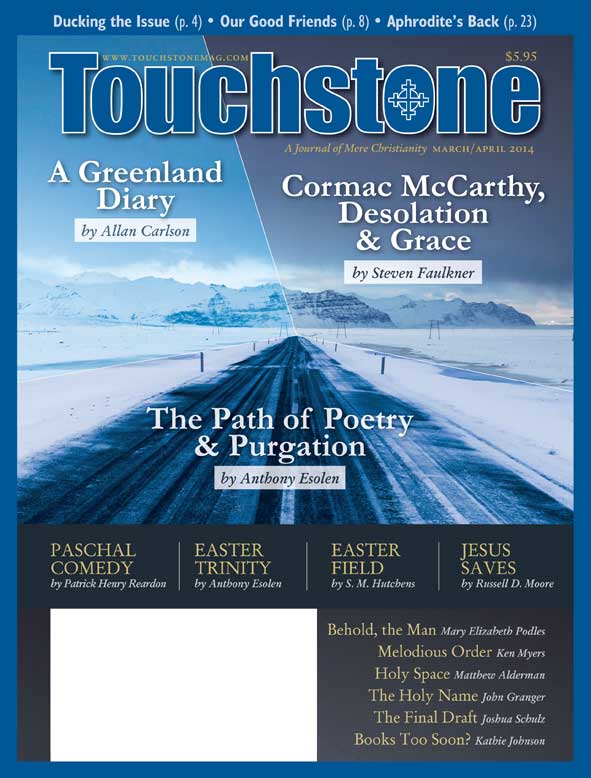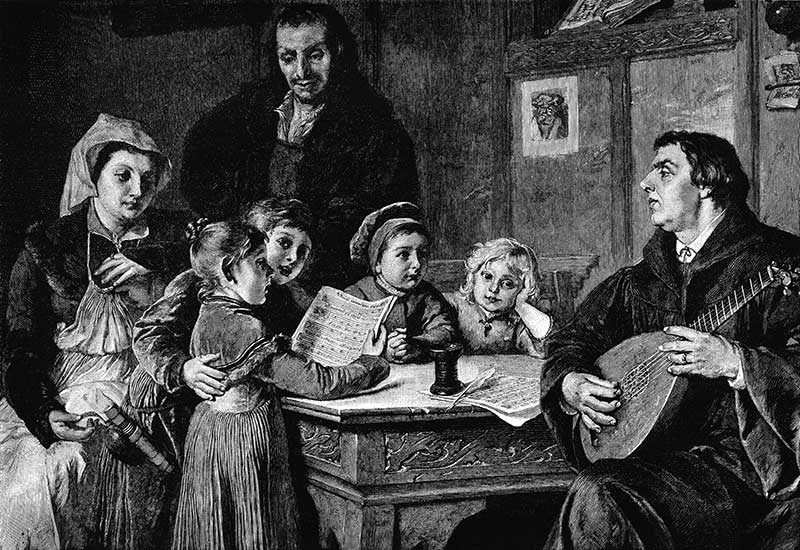Editorial
Jesus Saves
Why Touchstone Is Still Christian After All These Years
On a highway overpass, somewhere on a quiet stretch of road, there stand the spray-painted words "Jesus saves." That's the scenario envisioned by novelist and essayist Frederick Buechner:
Jesus saves. The effect, more or less, is that we wince. And, one way or another, we wince because we are embarrassed, and embarrassed for all kinds of reasons. Embarrassed because the words remind us of old-time religion and the sawdust trail and pulpit pounding, corn-belt parsons, evangelism in the sense of emotionalism and fundamentalism. We wince because there is something in the name "Jesus" itself that embarrasses us when it stands naked and alone like that, just Jesus with no title to soften the blow.
Now, of course, the title "Christ" was the most scandalous statement about Jesus in the Gospel accounts, so much so that Simon Peter's confession of this truth at Caesarea Philippi (Matt. 16:16) is a defining moment in the story. But Buechner saw a different reality at work in our time.
It seems to me the words "Christ Saves" would not bother us half so much, because they have a kind of objective, theological ring to them, whereas "Jesus saves" seems cringingly, painfully personal—somebody named "Jesus" of all names, saving somebody named whatever your name happens to be. . . .
Buechner is writing of something that encompasses the potential pitfall of any kind of effort toward an ecumenical orthodoxy. We are, after all, not in search of any sort of theological or ecclesial "dialogue." At our senior editors' gatherings, we all know there's no chance that I'll be immersing Patrick Henry Reardon into a baptistry at the end of it all, and there's no chance that I'll be singing Ave Maria.
We're not together because we're drawn to some sort of unity attempt. We're together because of what one observer has called the "ecumenism of the trenches." We have common cultural concerns, and wish to join together to speak to those concerns.
It would be easy, then, for a fellowship like ours to simply retreat to those places where we have the least-common-denominator agreement, and become a merely reactive movement, standing athwart history yelling "Repent!"
The path forward, then, might cause us to embrace more and more allies, regardless of whether they share our Christology. On this trajectory, we would talk more about "values" and "principles" and less about orthodoxy (small o) at all. We would speak more of "God" and "Western civilization," and much less about "Jesus" and "the Bible."
Always Returning to Jesus
Over a quarter century in, Touchstone has been able (so far) to avoid this temptation. We are not embarrassed by Jesus. And we speak of Jesus not simply with the distance of theological abstraction but with the personal confession that this man, Jesus of Nazareth, is the living Ruler of the cosmos, the kingdom of God in person.
We agree with C. S. Lewis that there is an order to the universe that is perceived even by those of different faiths or of no faith at all, what Lewis called the Tao. We agree that there is a place for Christians working with others to follow the prudential wisdom of this natural law where there is no common conviction about the special revelation of God in Christ. And we support efforts for Christians to work with non-Christians in movements toward the common good—indeed, virtually all of us are involved in such efforts for human dignity, for religious liberty, for family stability and the definition of marriage.
Touchstone's role in our common effort of addressing the culture is a specifically Christian one. Touchstone is a third space between our respective ecclesial communions and our external engagement. The magazine is a place where Southern Baptists can learn from Eastern Orthodox, where Roman Catholics can learn from Evangelical Anglicans. We walk away strengthened in our own particular commitments, but with something of the pooled wisdom that comes from those whose pilgrimages to the New Jerusalem start in Rome or in Constantinople or in Nashville.
And as we do so, we return again and again to Jesus. We disagree with one another on the authority of church and tradition, on the meaning of the sacraments, and even on how the pieces of the gospel plan of salvation relate to one another. But we return to our common creedal roots at Nicaea and Chalcedon that point us to the reality of Christ Jesus, "begotten not made, being of one substance with the Father, by whom all things were made."
And that's a good place to start.
No Embarrassment
The explicit Christianity of Touchstone serves the larger cultural project of our allies by reminding us why culture itself is important. The logos, the order holding the universe together, is, for us, not simply a "what" but a "Who." We contend for life for all sorts of reasons, but ultimately because we believe those bearing the image of God, the vulnerable "least of these," stand in solidarity with Jesus himself (Matt. 25). We stand for marriage for many compelling reasons, but ultimately because we believe the natural order points to the archetype of Christ and his Church (Eph. 5).
Our "mere Christianity" prevents us from being simply a fellowship of the disgruntled. Our vision of history isn't one of gloomy pessimism, but is instead encompassed by the vision of the moment when, as the hymn in my Baptist tradition puts it, "every foe is vanquished and Christ is Lord indeed."
Moreover, our mere Christianity reminds us of what, behind everything else, is the problem: a universe groaning under the curse of sin and death (Rom. 8). This ought to prevent us from a utopianism that would see a superficial fix to the problems we lament. But it also ought to help us to see that our opponents are not ultimately our enemies.
Russell Kirk wrote that Touchstone is a medium through which a conscience addresses a conscience. We must therefore contend, strongly, for what is true and what is just. But, as we do so, the very name of "Jesus" holds us back from pugilism and quarrelsomeness for the sake of quarrelsomeness. The angel told our Lord's adoptive father Joseph, "You shall call his name 'Jesus' for he will save his people from their sins" (Matt. 1:21). We write, then, not as the righteous, but as sinners, as those whose guilty consciences needed the cleansing of blood.
We fight, then, those forces we see destroying the people, the families, the communities around us. We say, in our various ways, "Repent, for the kingdom of God is at hand." But, we also say, "Behold, the Lamb of God who takes away the sin of the world."
This magazine, and the fellowship behind it, is a little project whose effects we cannot see in the short term. We throw it out into time and space, and leave the consequences to the Spirit of our God. But we do so as those who stand here and, without cringing or embarrassment, can say, "Jesus saves."
Russell D. Moore is president of the Ethics and Religious Liberty Commission of the Southern Baptist Convention. He is a senior editor of Touchstone.
subscription options
Order
Print/Online Subscription

Get six issues (one year) of Touchstone PLUS full online access including pdf downloads for only $39.95. That's only $3.34 per month!
Order
Online Only
Subscription

Get a one-year full-access subscription to the Touchstone online archives for only $19.95. That's only $1.66 per month!
bulk subscriptions
Order Touchstone subscriptions in bulk and save $10 per sub! Each subscription includes 6 issues of Touchstone plus full online access to touchstonemag.com—including archives, videos, and pdf downloads of recent issues for only $29.95 each! Great for churches or study groups.
Transactions will be processed on a secure server.
more from the online archives
calling all readers
Please Donate
"There are magazines worth reading but few worth saving . . . Touchstone is just such a magazine."
—Alice von Hildebrand
"Here we do not concede one square millimeter of territory to falsehood, folly, contemporary sentimentality, or fashion. We speak the truth, and let God be our judge. . . . Touchstone is the one committedly Christian conservative journal."
—Anthony Esolen, Touchstone senior editor









